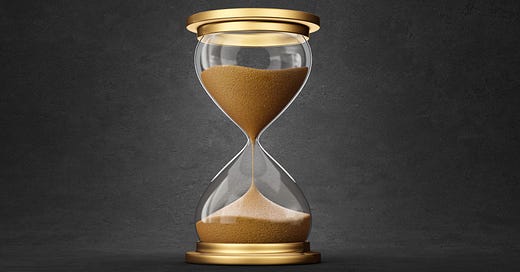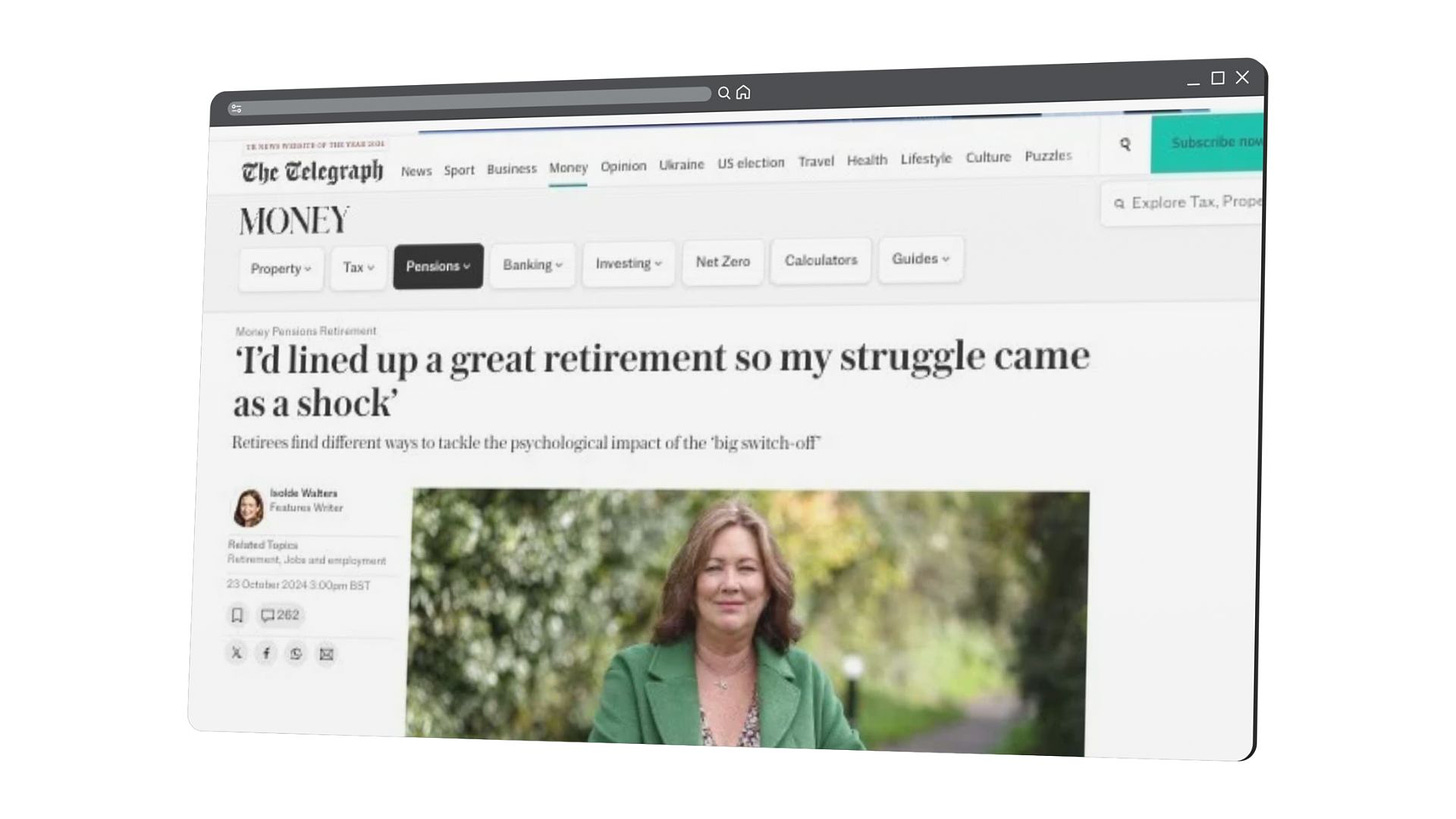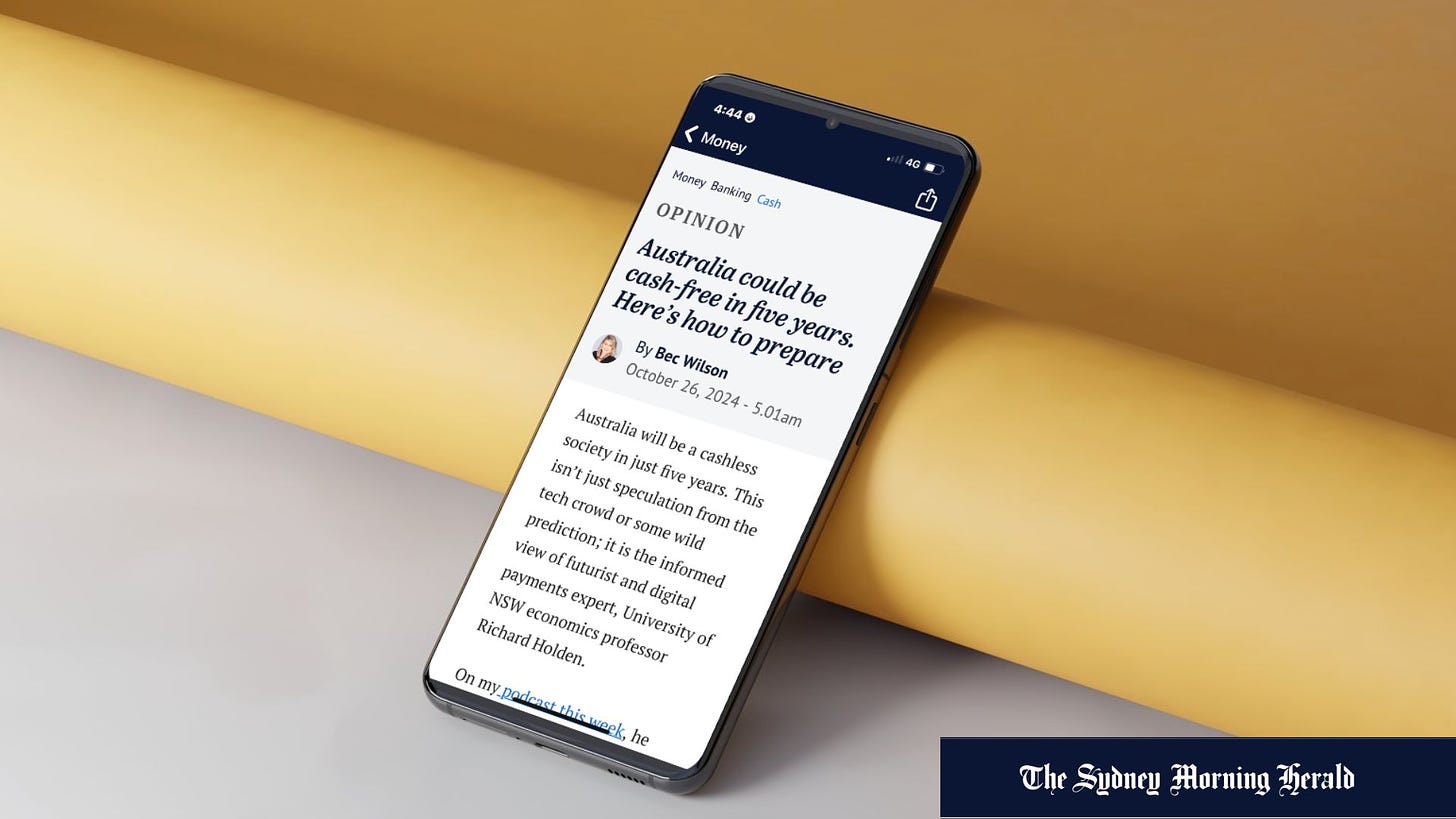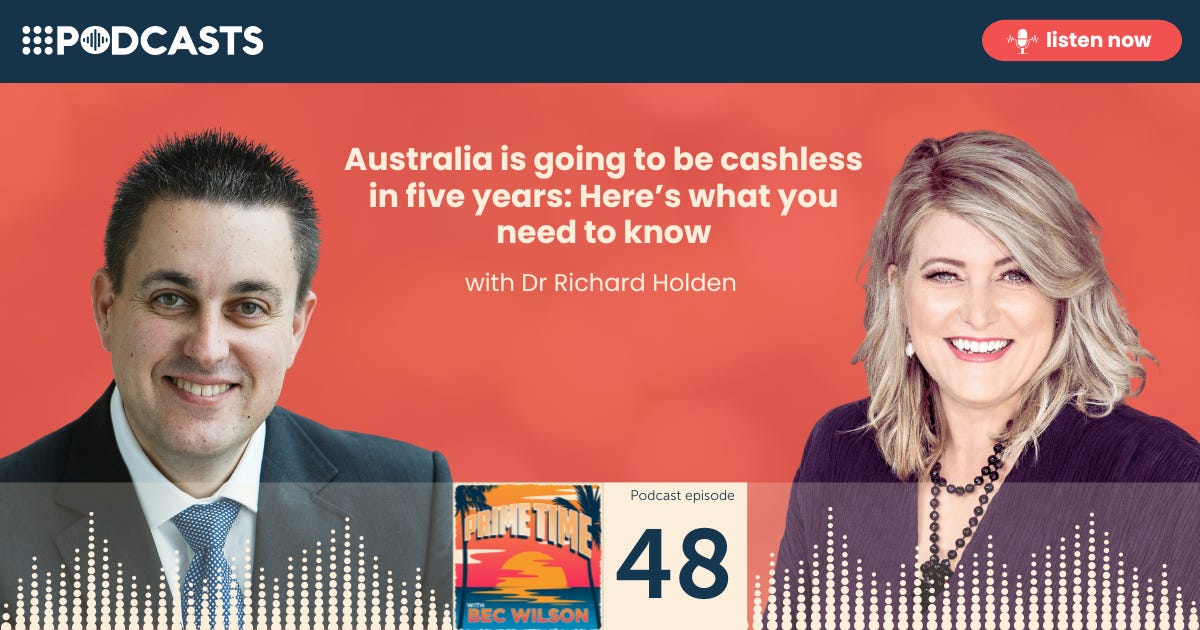Your one minute Epic Retirement check in
And in today's newspapers, 'Australia will be cashless in five years: are you ready'?
In this edition
Feature: Your one minute epic retirement check in - are you on track?
From Bec’s Desk: Featured in the UK Telegraph!
SMH/TheAge: Australia could be cash free in five years: Here’s how to prepare
Prime Time: Australia is going to be cashless in five years: the interview with Dr Richard Holden
Your one minute Epic Retirement check in
Whether you’re already retired, you’re looking hopefully towards the big day, or you’re trying to live your best life without fully retiring — this little three-question check in is designed to help you focus on what’s important.
I know everyone’s busy, but sometimes it just takes a minute to make sure we’re still on track and heading towards our best life. So today, rather then reading another long piece - I want you to go inside your head with this super-quick, one-minute check-in. Ask yourself these three questions – they’ll help you see if things are still aligned, or maybe point to how you can get them back on track.
Do I know what I actually want from this stage of my life?
If you’re still working, think about what you really want when your epic retirement arrives – more travel, projects, family time? If you’re already there, ask if what you’re doing now you’re retired is still lining up with what matters most to you - or have you drifted in focus. It’s your Prime Time and Epic Retirement, so make it fit you.Are my finances doing the job?
Pre-retirees, is your savings and investing plan strong enough for what you want to do in the years ahead — or can you adjust it and improve it? For retirees, take a quick look at spending. Are you funding the things that bring you joy, or could you do a little reshuffling to make life more fulfilling?Am I finding a good balance between ‘now’ and ‘later’?
If you’re close to retirement, don’t save it all for ‘someday.’ Enjoy some of it now. Already retired? What’s next? Your Prime Time keeps going until you stop– there’s always room for the next adventure. Have you got one planned?
One minute with these questions and you’ll know if you’re still on track to live this stage on your terms. Your epic retirement is really about making the most of these wonderful years we get to spend in good health — stay foccused on your active choices.
Of course, if you haven’t read the book, you might wonder what it’s all about! You can order your copy from Amazon online and Big W online too. Or pick up a copy at your local Big W, or QBD stores.
What a buzz! The Epic Retirement made waves with the Brits in The Telegraph this week!
It looks like the hunger for an Epic Retirement is spreading beyond Australia. The Telegraph in the UK ran a feature diving into the Epic Retirement framework, the book, and The Epic Retirement Club. Have a read – it’s not paywalled, even though it might look like it - there’s a tiny link to skip past the paywall!
In book news - I’m still tinkering with the last few pages, forewords, and case studies for my new book, Prime Time, which made it largely to the publisher right on schedule last Friday – phew!
Now we’re onto the next stages: editing, polishing, typesetting, proofing… and proofing again. It’s incredible to watch a professional publisher bring the whole thing to life! I’ve seen two wonderful cover options — and I can’t decide, so they’re asking a committee can you believe! Watch this space — it will be previewed soon.
—
The Epic Retirement Course is now rolling into Week 3 – and it’s all about finances.
Right now, everyone’s deep in their budgeting process, really digging into the numbers. Soon, they’ll start looking at their superannuation and thinking about whether it’s actually set up to work for them. Our Live Q&As keep right on pace with the weekly on-demand lessons, giving everyone a chance to ask questions and get real-time insights as they go. This week we have David Lane from Ord Minnett to answer tricky questions on superannuation, SMSFs and investing.
—
Next we have to talk about my big conversation on going cashless
Last time I raised this topic, the feedback was passionate – let’s say people have strong feelings about it! A lot of that was pretty emotional and didn’t always have the latest insights on what’s really driving the cashless economy and who’s paying for it — so I found a great expert who could explain it. So, if you’re curious about what’s actually happening and what it means for us all, tune into the Prime Time podcast this week.
Thank you to everyone who shared feedback in the podcast newsletter – loads of great thoughts - read them on the post at primetimers.net.
Dr Richard Holden is absolutely the expert in this space — and he’s a great explainer!
Finally - talking, education and getting out there
I’m starting to map out the year for 2025 can you believe and I want to do more guest speaking and lot more education within companies and organisations. If you have a conference or a cohort I can help! Want me to speak or educate somewhere? Email me.
And don’t forget to send me your letters! I love them. Please, send them to bec@epicretirement.com.au.
Many thanks! Bec Wilson
Author, podcast host, columnist, retirement educator, and guest speaker
Australia could be cash free in five years: Here’s how to prepare
Extract of article published in print in The Age, The Sydney Morning Herald, Brisbane Times, WA Today on Sunday 27th September 2024.
Australia will be a cashless society in just five years. This isn’t just speculation from the tech crowd or some wild prediction; it is the informed view of futurist and digital payments expert, University of NSW economics professor Richard Holden.
On my podcast this week, he says: “We are definitely moving towards a cashless society, probably in less than five years,” and the data backs him up.
In 2019, cash made up only 13 per cent of transactions in Australia, and today, some major banks report that cash is used in fewer than 4 per cent of their dealings. According to the FIS Worldpay Global Payments Report, Australia is projected to be 98 per cent cashless by 2024, and cash payments are expected to decline to just 2.1 per cent of in-store purchases.
Yet, despite these realities, we’re still lagging. We’re not doing enough to help older generations embrace digital payments, nor are we building the infrastructure needed for those in regional areas, and nor are we providing education and help for people who still feel more secure.
Banks and politicians often tread carefully around the issue, mindful of the large voter and customer base who still want the option of cash preserved.
But this caution may be delaying crucial discussions about how to better prepare and support those who will inevitably face this digital shift. Many are unaware of the full extent of cash’s decline or what’s likely to happen as it fades away – and what they can do.
Here are six insights into the cashless economy that I believe people need to understand better. Some may disagree, but I’m here to be an independent voice of literacy, education and reason.
1. Banks aren’t the villains in the story
When people think about fees in a cashless world, they often blame the banks. But it’s important to understand how digital transaction fees actually work. The fees we see on our receipts aren’t always coming from the banks.
Often, small retailers add their own surcharges to cover the cost of using payment infrastructure, like EFTPOS terminals. As Holden says, retailers have a choice: some absorb these costs, benefiting from reduced risks and labour involved with handling cash, while others pass the charges on to consumers because they can.
The truth is, banks aren’t profiting off every tap; they provide the infrastructure, and it costs money to maintain. Much of the fees you pay at the checkout are set by the retailers themselves. That’s why the government has moved to cap surcharges on card transactions – to stop businesses from overcharging consumers. It’s a move aimed at ensuring fairness at the checkout.
2. Fees will evolve in a cashless economy
As we continue to shift towards a cashless society, fees will inevitably change. With fewer people using cash, maintaining the infrastructure required for handling physical money – like ATMs, bank branches, and armoured cars for cash transport – becomes more expensive and could even be unviable.
The cost of managing cash doesn’t just disappear as fewer people use it; in fact, the costs of keeping cash around go up. This may mean surcharges on cash withdrawals or higher fees for physical currency transactions to cover those costs.
This article continues… and it’s worth a read!
Read on, in The Age, The Sydney Morning Herald, Brisbane Times and WA Today.
Australia is going to be cashless in five years: the interview with Dr Richard Holden
The percentage of cash transactions is likely now well into the single digits, and many people in midlife and beyond are feeling anxious. Concerns range from big banks charging "outrageous fees," to the fear of being without cash during natural disasters, and the risks of scams or having money stolen online. These are all perfectly valid concerns. So today, we’re going to dig into what’s really happening as cash disappears in Australia over the next five years.
I’m about to bust this wide open. We're tackling your concerns head-on and debunking the myths around who stands to win or lose as we shift to a cashless society.
Joining me is Dr. Richard Holden, Professor of Economics at the University of NSW, futurist and author of Money in the Twenty-First Century: Cheap, Mobile, and Digital. I’m also talking to Kylie Hall, Queensland State Manager of the Commonwealth Bank.
Dr. Holden is one of the leading voices on the future of cash. He has a deep understanding of how fees are actually charged on digital transactions, what governments should be doing in the face of natural disasters that wipe out power and internet, and what’s really coming down the pipeline in the next few years. His research is unbiased, and he’s extensively studied the decline of cash and its ripple effects. And Kylie Hall is at the coalface when natural disasters strike so she’s seen and managed what really happens.
Here’s why I’m passionate about this: I think cash lobby groups are playing on your fears, amplifying them to boost their own influence. Instead of fearmongering, we need to focus on educating, guiding, and helping people calmly navigate these changes and put in place new ways of doing things. Right now, we’ve got time to learn and adapt — so let’s use it to point to what we need to do, and help people, governments and businesses get there.
The reality is, cash will likely fade out over the next five years, whether we like it or not. Rather than resisting or ignoring the change, it’s smarter to understand the alternatives and the steps that governments, businesses, and financial institutions are already taking to ensure we all have safe, reliable ways to manage money in a cashless world and drive them to do more of what we need. We need to engage with this shift and prepare ourselves for the future—because it’s going to be effectively cashless.
LISTEN TO THIS EPISODE OF THE PODCAST HERE:













I truly hope the cashless thing doesn't happen. I live in an area where I can go for a drive and get my fruit, veg, eggs and flowers seasonally from roadside stalls. Firewood, all manner of 'poos' for the garden. That all dies.... already if technology fails we can't shop. I listened to an outstanding podcast years ago about new age warefare : drones (we are already seeing that ) and hacking to disrupt water supplies, ability to buy food, hospitals to operate.
All the old sayings are there for a reason... 'don't put all your eggs in one basket '.
This will all be fine for the rich and powerful . But it's the rich and powerful who start wars, who galvanise misinformation , and gain the most from it.
And don't try to whitewash the banks. In an age of massive banking profits they make it more and more difficult for the young to access home loans. They are focussed on making money and power and control: greed. Banks are about their shareholders, not what's good for society.
I embraced the cashless way of life during pandemic. I might be quite mature but I am very comfortable with all technology (coming from a long career in IT). Problem is, I have actually found it getting more difficult to stay away from cash and while I can see how credit charges may increase, I can see many areas for using cash, will still exist for quite a while.
I think the preference of many people to persist with the use of cash, will prevail for many years. Here a few obvious ones (from comments from others and observations):
-people give cash as presents, especially to children. Vouchers, less so.
-using cash means no fees, especially under current cost of living pressure and many consumers use cash for everything they can (debit card is alternative)
-banks are not always considered trustworthy by some, with all their information, especially if a very private purchase
-some smaller retail areas are finding it hard to finance credit facilities. Whilst much of the fees are put on the consumer, there are many costs involved for them. Quite a few retail places will provide a discount for buying in cash. This has been noted at small shops but also farmers markets.
-credit cards work well in major towns but there are still quite a few more remote parts of Australia where cash is sometimes more reliable (and familiar)
-of course, whilst it is easy to label those of us in the "babyboom" generation as being more comfortable with cash, many of the younger ones (Gen Z) have moved towards cash too.
An interesting side observation is that there are many people at the supermarket who only want to use cash which leave the credit card only self serve areas more available. I was often baffled by this as I hustle through quickly using Apple Watch to pay. That got me thinking about the issues people have for them to prefer cash.
I feel quite liberated leaving the house without a wallet; I can do it all on my phone, not only for purchases but my travel card and license are both available in a digital form. I am very happy with this but of course, I think maybe it is a "townie" thing. I sometimes carry my minimalist wallet with a credit card or 2, license and a small amount of cash in the instances where I think mobile coverage is limited or the infrastructure is limited. A recent trip to remote Australia was a good example.
Jennifer gave some very good examples of why cash is still useful. I can see the economy becoming cashless eventually but there will still need to be cash for many, many people for quite a few years. Cash will not dissappear while it still has it uses.